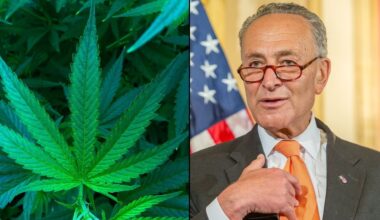[ad_1]
The governor of Kentucky has named members to a medical marijuana committee that will conduct public hearings on the issue and advise the governor on ways he can advance patient access while the legislature refuses to enact reform.
Gov. Andy Beshear (D) made the announcement on Tuesday, issuing an executive order to put 17 experts on the panel that will soon be traveling the state to learn more about public views toward medical cannabis legislation and diving into various aspects of the issue.
“Polling suggests 90 percent of Kentucky adults support legalizing medical cannabis, while at the same time, far too many in our state who could benefit from it are suffering,” Beshear said in a press release.
Today, Gov. Andy Beshear announced the members of the Team Kentucky Medical Cannabis Advisory Committee that will help advise him on providing access to medical cannabis for Kentuckians suffering from chronic pain and other medical conditions.
Read more: https://t.co/1fLGexw4hU pic.twitter.com/9PTk760O1q
— Governor Andy Beshear (@GovAndyBeshear) June 14, 2022
“It is simply time that something more is done,” he said. “I want to make sure every voice is heard as I am weighing executive action that could provide access to medical cannabis in the commonwealth.”
In April, the governor previewed plans to advance the issue of medical marijuana administratively, criticizing the Senate for failing to heed the will of voters and for “obstructing” reform by refusing to even give a hearing to a House-passed bill this year.
Beshear has made several recent comments about the possibility of taking executive action on cannabis policy, but with a House-passed medical marijuana legalization bill now dead after the end of the legislative session, he’s expressed openness to administrative action. This latest announcement marks a key step to that end.
Secretary of the Justice and Public Safety Cabinet Kerry Harvey and Secretary of the Public Protection Cabinet Ray Perry will serve on what’s being called the Team Kentucky Medical Cannabis Advisory Committee. Here are the other members, appointed through executive order:
- Dr. Amber Cann of La Grange, pharmacy coach and adjunct professor at Spalding University
- Julie Cantwell of Rineyville, advocate with Kentuckians for Medical Marijuana
- Jennifer Cave of Louisville, member, Stites and Harbison
- Eric Crawford of Maysville, advocate
- Cookie Crews of Frankfort, commissioner of the Department of Corrections
- Dr. John Farmer of Louisville, OB/GYN, medical director of Solid Ground Counseling and Recovery, addiction treatment provider in Louisville, Morehead and Hazard
- Dr. Jonathan Hatton of Whitesburg, family medicine, Mountain Comprehensive Health
- Brian Jointer of Jeffersonville, Indiana, certified public health worker in Louisville
- Dr. Nick Kouns of Lexington, internal medicine, Clark Regional Medical Center
- Alex Kreit of Cincinnati, Ohio, director of the Chase Center on Addiction Law and Policy at Northern Kentucky University
- Dr. Linda McClain of Louisville, OB/GYN, Commonwealth Counseling Center
- Andrew Sparks of Lexington, former assistant U.S. Attorney
- Dee Dee Taylor of Louisville, chief executive officer, 502 Hemp Wellness Center
- Julie Wallace of Morganfield, Union County Attorney
- Kristin Wilcox of Beaver Dam, co-founder of Kentucky Moms for Medical Cannabis
Kreit is a longtime drug policy expert and activist, having founded one of the first chapters of the advocacy organization Students for Sensible Drug Policy in the late 1990s.
“The committee will come together for the first time in the near future to schedule town hall meetings that will be held throughout the commonwealth,” the notice says. “Townhall meetings will be open to the public for discussion and feedback from residents, local leaders, health care providers and advocacy groups. Meeting details will be released in advance.”
Additionally, the governor’s office announced the launch of a new website “where Kentuckians can learn more about the upcoming work of the advisory committee and submit their own feedback.”
“Allowing Kentuckians diagnosed with certain medical conditions and receiving palliative care to cultivate, purchase, posses and/or use medical cannabis would improve the quality of their lives and may help reduce abuse of other more dangerous and addictive medications, such as opiates,” the governor’s executive order says. “It would also improve Kentucky’s economy by brining new jobs and businesses to the Commonwealth, as well as supporting Kentucky farmers.”
“In the absence of legislation legalizing medical cannabis, I am committed to reviewing what executive action could provide relief to Kentuckians and allow those suffering from chronic pain and other medical conditions to use medical cannabis,” it says.
Nearly 90% of Kentuckians support legalizing medical cannabis. Too many are suffering from chronic pain and medical conditions, and this is a solution that could help. Today @GovAndyBeshear took action. We are listening to the people and we are committed to doing what’s right. https://t.co/4Viyu4RzNB
— Lt. Governor Jacqueline Coleman (@LtGovColeman) June 14, 2022
A medical cannabis legalization bill from Rep. Jason Nemes (R) that passed the House this year did not get a required Senate reading ahead of a legislative deadline to advance this session, but there were some who had held out hope that its provisions could have been attached to separate legislation before time ran out on the session.
That was some wishful thinking, especially in light of remarks from Senate leadership challenging or outright opposing the idea of passing medical marijuana reform this year.
Senate Floor Leader Damon Thayer (R) steadfastly opposes the broader medical cannabis policy change, having warned that it’s a fast-track to full legalization. He said in March that the House-passed medical marijuana legislation had no chance of passing this session and it’s “done for the year.”
“I know my constituents are for it,” Thayer, who owns a whiskey distillery, said during a televised panel in January. “But this is a republic, and they elect us to go to Frankfort and make decisions on their behalf—and if they don’t like it, they can take it out on me in the next election.”
—
Marijuana Moment is already tracking more than 1,000 cannabis, psychedelics and drug policy bills in state legislatures and Congress this year. Patreon supporters pledging at least $25/month get access to our interactive maps, charts and hearing calendar so they don’t miss any developments.![]()
Learn more about our marijuana bill tracker and become a supporter on Patreon to get access.
—
Democratic leaders from both chambers, meanwhile, said in January that legalizing medical marijuana would be a top legislative priority for this year’s session. And in the spirit, Senate Minority Floor Leader Morgan McGarvey (D) and two other colleagues filed their own legalization measures in February.
The companion legislation—SB 186 and HB 521—is dubbed LETT’s Grow, an acronym built of the bills’ main components: Legalizing sales, expunging crimes, treatment through medical use and taxing of adult-use sales.
For his part, Nemes filed an earlier medical legalization bill in 2020 that soundly passed the House but later died in the Senate without a vote amid the early part of the coronavirus pandemic. He reintroduced the legislation for the 2021 session, but it did not advance.
Nemes has continually expressed confidence that the reform legislation would advance through the legislature if only leadership had the “courage” to put it to a vote.
While Beshear has said that his focus would be on getting medical cannabis enacted this year, he said he also supported legislation introduced by Rep. Nima Kulkarni (D) in November that would simply prevent people from being incarcerated over marijuana for any use, saying he’s in favor of that policy.
Kulkarni’s bill would legalize the possession and personal cultivation of cannabis, but it doesn’t provide a regulatory framework for commercial sales.
The governor also voiced support for broader legalization late last year, saying that it’s “time we joined so many other states in doing the right thing.” He added that Kentucky farmers would be well positioned to grow and sell cannabis to other states.
A poll released in 2020 found that nine out of 10 Kentucky residents support legalizing medical marijuana, and almost 60 percent say cannabis should be legal under “any circumstances.”
New Mexico Marijuana Company And Patients Sue For Insurance Coverage For Medical Cannabis
Photo courtesy of Chris Wallis // Side Pocket Images.
[ad_2]
Source link
Medical Disclaimer:
The information provided in these blog posts is intended for general informational and educational purposes only. It is not a substitute for professional medical advice, diagnosis, or treatment. Always seek the advice of your physician or other qualified healthcare provider with any questions you may have regarding a medical condition. The use of any information provided in these blog posts is solely at your own risk. The authors and the website do not recommend or endorse any specific products, treatments, or procedures mentioned. Reliance on any information in these blog posts is solely at your own discretion.







